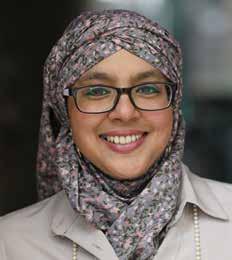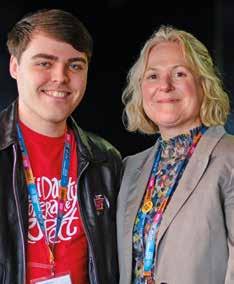
5 minute read
Decisions, decisions
Anti-trade union laws
Conference passed a motion to condemn the Strikes (Minimum Service Levels) Bill, which would allow the Education Secretary to override a lawful, democratic decision for strike action.
Build a mass labour movement
Delegates voted to pass a motion to develop a mass labour movement response to the Government’s attacks on workers’ rights and living standards.
Professional unity
Danielle Hosford from West Hampshire proposed a motion calling for greater professional unity among the education unions.
Control of the curriculum
A motion campaigning for control of the curriculum and a reform of the exams system was moved by Trudy Oldroyd from North Yorkshire.
simply don’t have the time to give them the support they need, despite knowing I am a good teacher.”
Support staff strategy
Patrick Martin from Brent moved a motion calling for the union to develop a support staff strategy. Monique Lambie, a teacher from Harrow, said: “Support staff members are the lifeblood of our schools, and we would be lost without them.”
Support staff members had recently become members in her school and refused to cross the picket line during the strike action.
Fred & Anne Jarvis award Onjali Q Raúf
CHILDREN’S author Onjali Q Raúf (pictured right) was named winner of this year’s Fred and Anne Jarvis award. Accepting the award, Onjali, whose books tackle issues such as domestic violence, unaccompanied refugees and food poverty, said she was “jaw-droppingly astounded” to receive it.
“Thank you so much. It is incredible to me. It wasn’t even on my horizon that my books would be taken into schools and that teachers would do such amazing things with them,” she added. “Thank you, every single one of you, who has done that with my stories.”
Philipa Harvey nominated Onjali, whose books include The Boy at the Back of the Class and The Star Outside My Window, on behalf of the Croydon district.
“She has written books for children that are stories they love, but they are also stories that get them thinking about really important issues,” said Philipa. “Each book she has written looks at these issues through the eyes of children and asks the questions they would ask and allows them to explore the answers they want.”
Primary curriculum
Yvonne Hardman from County Durham moved a motion calling for the reform of the rigid, assessmentheavy primary curriculum and teacher training.
Stop toxic testing
This motion was amended to remove the call to boycott SATs this year.
Early years
Conference recognised a “massive shrink” in early years provision, with thirty-five per cent of nurseries closing after the pandemic.
Agency workers
Shelagh Kavanagh from Cambridgeshire moved this motion reaffirming the union’s opposition to the use of supply worker agencies.
Urgent motion on Palestine
Louise Regan, from the executive, said: “Our support for Palestine is

“This was despite the significant impact the loss of a day’s pay would have on them,” said Monique. “I was so proud of this action.”
Maternity rights
Conference passed a motion to strengthen the rights of pregnant women, bereaved parents, new mothers and women returning to work. Speaking in the debate, Laura Watford from Portsmouth said working mothers are “pregnant then screwed”.
She compared the £2,000 a month she pays for childcare to the maximum annual £1,596 a parent in Germany pays for a not new, but is needed now more than ever.”
Organising in the workplace
This called for a continuation of the organising approach, strengthening reps’ networks and training.
Pay in the independent sector
The union will continue its national campaign to defend members working in the independent sector, who are facing attacks on their pensions and contractual rights.
Arts and music in education Conference passed a motion calling on the union to campaign for music and the arts to take an equal place in the curriculum.
nursery place. “Is it any wonder women aged 30 to 39 are the largest group to leave our profession?” she asked.
Amy Kilpatrick from Newcastle said that the NEU’s maternity survey carried out last year had shown examples of excellent practice in some workplaces, but added: “Sadly, these were drowned out by the avalanche of horror stories we received, from women being told to express milk in a toilet or a car park, to being refused flexible working, or continuing to stand in front of a class and teach while knowingly miscarrying a much longed-for baby.”
Sexual harassment and violence
Louise Regan from Nottingham stated that 50 per cent of girls have suffered sexual harassment at school and 70 per cent have faced misogyny, according to UK Feminista’s It’s just everywhere report. Abuse affects one in four women in a lifetime.
“Our job is to challenge this. Last year the NEU launched the It’s not OK –preventing sexism and sexual harassment toolkit. It was extremely well received. We now need action not words. We need all schools to be using this.”
Representation of women
This motion called for 50 per cent of conference delegates – by 2025 – to be women. Susanna Kellett from Tower Hamlets continued on page 18
PATRICK Jenkins from St Albans spoke for the first time, on the early career framework, and thanked Emma Rose, a modern foreign languages teacher and NEU senior vice-president from Warwickshire, for inspiring him to become a teacher.

Patrick told Educate: “I was thinking, teachers inspire teachers. That’s one of the reasons I’ve ended up here, being an early career teacher and speaking on this motion.
“You know, not just Emma, but all the teachers I had at school – I went to Trinity Catholic School in Leamington Spa – were inspiring. Really good teachers who helped me become what I wanted to be. And it’s quite inspiring to see Emma out there in the sort of upper echelons when she was previously my teacher.
“I was surprised to receive a standing ovation. I wasn’t expecting it from the conference floor, particularly as it was my first time speaking.”
Emma said: “I didn’t know Patrick was going to say that – it made me feel really emotional and hugely honoured. It’s a real privilege to teach. I love it. Certainly we don’t do our job to be thanked, but it’s nice when you get thanks.
“I think it’s such an important job – I became a teacher because I wanted to change the world. Seeing people like Patrick coming through into teaching, talking with such passion abut some of the things that are wrong and wanting to change them, I just think wow, what a brilliant thing.”
n OFSTED
Chairing a fringe session on Ofsted, NEU joint general secretary Mary Bousted said she believed we have reached a moment when there is a shared feeling that the inspectorate must go. Urging members to go back to their schools and ask their heads to take down Ofsted banners, Mary added that the union is also asking leaders not to participate as inspectors. “If school leaders stopped inspecting, the system would collapse,” she said.
n SECONDARY ASSESSMENT
Members heard from a group of speakers who are moving away from exam-only assessment. Among them was Prerna Patel, who leads on assessment at Aspirations Academies Trust, which runs 16 schools across the south of England. It has adopted a multi-model assessment approach. Prerna said the trust had made “big and bold” changes to its curriculum.
n FREE SCHOOL MEALS
This session discussed the union’s successes and next steps. Teacher Sarah Kilpatrick said: “It is unthinkable that a child in a country as wealthy as the UK should suffer due to a lack of food.” Teacher and Labour councillor James McAsh added that “20 per cent of households with an education worker are facing food insecurity”.
n PALESTINE SOLIDARITY CAMPAIGN (PSC)
Delegates heard from Nicole Zoylinos, a member who had been on a delegation to Palestine with the NEU, about demolished schools, teacher strikes, checkpoints and more. Louise Regan urged people to sign up to the PSC.
n PICKETS, PARENTS, POWER
This workshop was focused on winning strike action with parental support. It heard from Alexandra Bojanic, a French trade unionist, who talked about France’s recent unrest over pension reform. It also heard from Diane Wilkinson from Lambeth who talked about how they achieved a 98 per cent turnout in the formal ballot. Finally, Debbie Kahler from Wakefield talked about activating members who were new to strike action – including support staff. The session then broke into groups to plan for strike action in late April/May.








